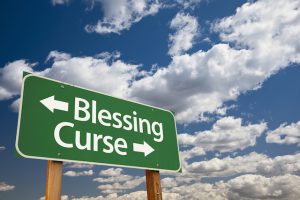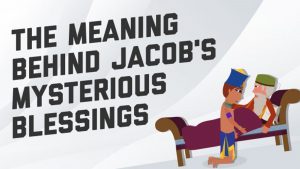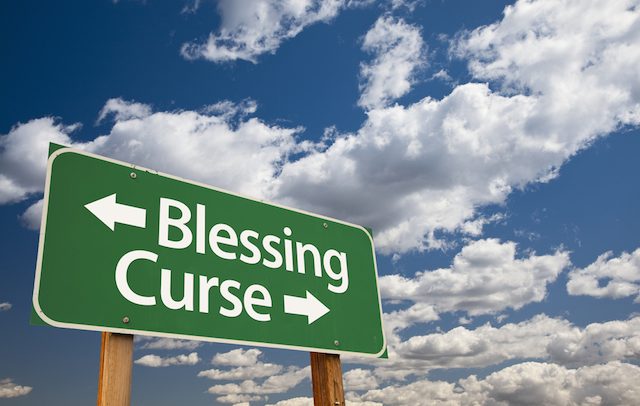 Deathbed Curses & Blessings
Deathbed Curses & Blessings
Is there a difference between a blessing and a curse? Zicher there is and so logic would dictate! Ober, can a curse also be a blessing? We shall explore that topic this week as we close out Sefer Bereishis with Parshas Vayichi.

Shoin, a happy new year to all, a happy birthday to me (tomorrow, January 1), and let’s hope that the year ahead is better than 2020; can it be worse?
And welcome to Parshas Vayichi as we say goodbye to Yaakov, Yoisef and his holy brothers. Yaakov and Yoisef will die in the parshas and by next shabbis, they’re all dead. As Bereishis come to a close, so too does the selection and rejection of certain individuals we have met along the way. Kayin’s korban (sacrifice) was rejected by the RBSO. In turn and in a fit of jealousy, he rejected his brother Hevel and killed him. Noiach rejected one of his son’s following a shtikel sexual assault. Rashi told us that Noiach was either castrated, raped or both by his son and grandson; yikes! Our foremother Soro rejected Yishmoel and sent him packing. Rivka rejected Eisav and Yaakov loved Yoisef more than his other kids. Yoisef was of course rejected by his brothers. The bottom line: though it could be argued that all these families were at least a shtikel dysfunctional, each of them aside from Hevel who was dead (according to Kabbalistic sources, he was reincarnated), overcame and fared quite well. Yishmoel became the father of a very large nation, way bigger than us Yiddin. Eisav too did ok and the heylige Toirah lists his descendants and dedicates a full 43 pisukim (verses) to his family tree. Yoisef became viceroy of Egypt. Hevel came back mamish? Says the Arizal, azoy: Moishe was a reincarnation of Odom’s third son, Sheis (Seth), and that Sheis was a reincarnation of Hevel (Abel). Gishmak.

Shoin. The next people to be rejected will be the early version of the Yiddin, version 1.0, who will have gone from VIP’s upon their arrival to pariahs in a foreign country. Things are about to get ugly, the Yiddin will soon be enslaved and by next shabbis when we read Parshas Shmois, another 200 years will have passed. Ober, before we skip ahead, let’s take a shtikel dive into Yaakov’s last days and how he spent at least one of them doling out brochis (blessings) while also excoriating a few of his beloved children. Was yet another act of selection and rejection the last thing he did before passing away? Did he not learn lessons from the past? Did he not recall that jealousy led to Yoisef’s misfortunes and to his own suffering for over 20 years? We shall explore that too. Let’s set the scene as the heylige Toirah describes the events.
Yaakov is dying, his life has been complicated to say the least. His years were filled with strife and angst. He told Paroy (Vayigash 46:9) that his life has been bad and he’s correct.
| 9. And Jacob said to Pharaoh, “The days of the years of my sojournings are one hundred thirty years. The days of the years of my life have been few and miserable, and they have not reached the days of the years of the lives of my forefathers in the days of their sojourning’s.” | טוַיֹּ֤אמֶר יַֽעֲקֹב֙ אֶל־פַּרְעֹ֔ה יְמֵי֙ שְׁנֵ֣י מְגוּרַ֔י שְׁלשִׁ֥ים וּמְאַ֖ת שָׁנָ֑ה מְעַ֣ט וְרָעִ֗ים הָיוּ֙ יְמֵי֙ שְׁנֵ֣י חַיַּ֔י וְלֹ֣א הִשִּׂ֗יגוּ אֶת־יְמֵי֙ שְׁנֵי֙ חַיֵּי֣ אֲבֹתַ֔י בִּימֵ֖י מְגֽוּרֵיהֶֽם: |
Single and still living with his parents in his 60s, he found himself on the run from his brother Eisav who sought to kill him. In love with Rochel at first sight, he wound up working 14 years for his conniving shver to be (future FIL) and seven years plus a week or two before he could mamish love her, if you chap. Next tragedy: he’s suddenly married to four women (two full and two half-sisters), and before you know it, he’s a father to 11 boys and one girl. His next child is born as the love of his life is dying roadside. The brothers of the four mothers don’t get along but their shared hatred for Yoisef dad’s favorite, unites them; they (except Binyomin) plot to kill him. Beset by famine, he sends his boys to buy food (sans Binyomin) down to Mitzrayim where Shimon is held, they are all arrested and eventually Binyomin is held suspected of theft. Shoin! Was this a happy life? Oh, and we forgot to mention that his first born Reuvain bedded one of his wives. He did? What could be worse?
Welcome again to Parshas Vayichi where Yaakov is about to pass away. He decides to bestow brochis (blessings) on all his kids and two grandchildren born to Yoisef’ shiksa wife. They are gathered bedside waiting to hear their individual blessings. And then? He begins by tearing Reuvain a new tushy hole and follows that up by excoriating the next two, Shimon and Levi. We’ll get to them in a moment, ober efsher even more bizarre is this: he bestows a boatload of brochis – five entire pisukim worth- upon Yehuda, including white teeth, kingship; royalty mamish. Was Yehudah the first person with white teeth mamish? Ober, wasn’t it Yehudah who mamish told the brothers to sell Yoisef into slavery? It was! He’s the one being blessed in earnest? What’s pshat? And if that question weren’t enough and avada is should be, be aware that many a sage -older and more contemporary- have been flummoxed by these questions? How can we say that Yaakov set out to bless his kids when he did not -at all- bless Reuvain, Shimon and Levi? What’s pshat? Is it a wonder that Yehudah mamish backed away when it was his turn? Is that emes? So says Rashi. And who could blame him? Yehudah figured he’s next on the chopping block. Ober raboyseyee, as mentioned before, most of your questions and mine too, have been asked in the past. What’s up with Yaakov Ovenu? Did he or did he not bless all his boys? And if he did, what kind of a blessings is meant by the words used to chastise Reuvain, Shimon and Levi?
 The heylige Toirah tells us that Yaakov spent his last day or efsher days surrounded by his children and at least two grandchildren. And that he gave them all blessings, but did he? Or, did he continue the tradition of his grandfather Avrohom and emulated by his father Yitzchok when he decided to select and show favoritism to some while outright rejecting others. Did he not learn his lesson? Did he not recall how Yishmoel fell out of favor? How Eisav felt rejected? And what happened to his own favorite son Yoisef when his other boys rejected him? Were his last actions before passing away correct? Did he try to unify or further divide them? Did he cause further jealousy? Let’s set the scene:
The heylige Toirah tells us that Yaakov spent his last day or efsher days surrounded by his children and at least two grandchildren. And that he gave them all blessings, but did he? Or, did he continue the tradition of his grandfather Avrohom and emulated by his father Yitzchok when he decided to select and show favoritism to some while outright rejecting others. Did he not learn his lesson? Did he not recall how Yishmoel fell out of favor? How Eisav felt rejected? And what happened to his own favorite son Yoisef when his other boys rejected him? Were his last actions before passing away correct? Did he try to unify or further divide them? Did he cause further jealousy? Let’s set the scene:
Yaakov is on his deathbed proclaiming his last will and testament for his 12 sons He calls his sons together and gives each of them a personal message. Let’s read what he said to his first three children. “Reuvain, thou art my first-born, my might, and the first-fruits of my strength; the excellency of dignity, and the excellency of power. Unstable as water, have not thou the excellency; because thou wentest up to thy father’s bed; then defiledst thou it–he went up to my couch.” Did any of you notice any words of blessing? A hint of a brocho? Not!
Next up were Shimon and Levi to whom he said azoy: “Simon and Levi are a pair. Their weapons are tools of lawlessness. Let my person not be included in their council, Let not my being be counted in their assembly. For when angry they slay men, And when pleased they maim oxen. Cursed be their anger so fierce, And their wrath so relentless. I will divide them in Yaakov, Scatter them in Israel.”
Yikes! Any words of blessing there? Also not! In fact, one might argue that it’s punkt farkert (the opposite was true). Yaakov is seemingly pissed off at them and recalls very specific incidents in which the boys were involved. Seemingly he’s still smarting from the Reuvain bed incident. Of course, the heylige Gemora and others try whitewashing Reuvain’s actions and tell us with a degree of certitude that the entire myseh (story) is not emes. The Gemora insists that Reuvain but either moved or re-arranged the bed. Did he but move it? Or, did he re-arrange it with himself inside the bed? Ver veyst? Ober, are we doubting the words of the RBSO? Would Yaakov have been so damn mad had Reuvain just moved or re-arranged the bed? Had Reuvain not made up the bed as Yaakov had liked? Were the corners not tucked in properly? Moreover, we take Yaakov at his word when he tears Shimon and Levi apart for their role in the Shechem and Dina incident but we don’t when he reminds Reuvain that he did a non-no? What’s pshat? The bottom line: Mamish with his last words, he chastises them and offers not one word of blessing. And before we dig deeper and learn what others had to say about Yaakov’s blessings/curses, let’s first see what he had to say about Yehudah. We will skip the others but they and especially his favorite son Yoisef- all got brochis of some sort.
“Yehuda, thee shall thy brethren praise; thy hand shall be on the neck of thine enemies; thy father’s sons shall bow down before thee. Yehuda is a lion’s whelp; from the prey, my son, thou art gone up. He stooped down, he couched as a lion, and as a lioness; who shall rouse him up? The scepter shall not depart from Yehuda, nor the ruler’s staff from between his feet, as long as men come to Shiloh; and unto him shall the obedience of the peoples be. Binding his foal unto the vine, and his ass’s colt unto the choice vine; he washeth his garments in wine, and his vesture in the blood of grapes; His eyes shall be red with wine, and his teeth white with milk.” And that is what we call a brocho when dad likes you.
Let’s chazir: Yaakov sets out to bless his own sons. He wishes to tell them what will befall them in the End of Days. Ober, to Reuvain, Shimon and Levi, Yaakov offers only chastisement for their earlier actions. Reuvain, for interfering with Yaakov’s marital bed (read: Reuvain, at least as told in the heylige Toirah (Bereishis 35:22), bedded his father’s wife, one of them), and Shimon and Levi for their rash attack on the people of Shechem (34:25-26). Read: they killed every male! Fartig. In fact, Yaakov goes so far as to curse Shimon and Levi’s rage, scattering their future descendants among the other tribes. Not until he gets to Yehudah does Yaakov begin offering blessings in earnest. Yaakov blesses him with lion’s strength, prosperity, and wise and powerful descendants.
Our sages of yore disagree whether what we have called “Yaakov’s blessing to his sons” indeed deserves this name. says the Ibn Ezra: “Those who say these are blessings, on the grounds that the passage concludes with the words “and he blessed them,” are mistaken; where are the blessings to Reuvain, Shimon and Levi? And so far as the conclusion “and this is what their father said to them” (49:28) ‘and afterwards he blessed them’, [this is true] but Scripture does not mention what the blessing was.” In other words: what came before are not blessings.
Ober listen to this very gishmake pshat which tells us azoy: as referenced just above, our sages rely on another posik to prove otherwise. They point to posik 49:28 to prove that indeed he did bless them all. Did he or did he not? Shoin, let’s re-read that one posik which says azoy: “Kol ele shivtei Yisrael shenayim ossor, v’zois asher diber lohem avihem vayivorach oisom ish asher k’virchaso beirach oisom.” And in English: These are the twelve tribes of Israel, and this is what their father said to them, and he blessed them, each individual according to his blessing, he blessed them.”
There are two distinct parts to the verse. First, we are told about the number of shvotim, and then how their father blessed them. In other words: the heylige Toirah goes out of its way to tell us that there were 12 tribes. Ober, don’t we already know that? And where else have we seen these very words? Shoin, let’s harken back to the Reuvain’s bed mounting incident where just after the scandal, the heylige Toirah (35:22) told us azoy: “And Yaakov’s sons were twelve.” In other words: though he may have chapped improperly by mounting the forbidden, he remains part of the 12 sons and future tribes to be. He is not ex-communicated. Givaldig and a great lesson in parenting and forgiveness by the RBSO. In our parsha too, something has happened which threatened the family’s unity and stability. Yaakov excoriates Reuvain, Shimon and Levi and bestows blessings on the others. And just after, we find the unity posik. They are still 12 children of Yaakov. They emerge from the crisis. In the case of Reuvain, the crisis is clear. A son has questioned and actively challenged his father’s choice of conjugal partners. What is to become of him, and how does it affect the family? The RBSO forgives sexual indiscretion: “VaYihiyu B’nai Yaakov shenaim assar”, Yaakov’s sons are twelve. As an aside, and as the Oi shas told you over the years, this is not the first nor last time the RBSO will show some flexibility where the cases of sexual impropriety are rather clear. Let’s not forget everyone’s’ favorite King, Dovid Hamelech. Of course, don’t take that a license to mount wherever you so please, chazir (pig) that you are: forgiveness from the RBSO is by choice, His choice only.
And the same is avada emes with regard to Shimon and Levi. Yaakov taka was quite upset and he, with his last breaths reminded them of their indiscretions when they took it upon themselves to kill all the Shechemites and the rapist himself. What is it exactly that has brought down his wrath upon these two? Yaakov is seemingly upset with them over two incidents: 1- the massacre in Shechem where the brothers killed all townsmen of the city by connecting them to the rape of their sister Dinah, and 2- the manhandling and kidnapping of Yoisef (referred to as an ox at the end of Devorim) that was masterminded -according to many a commentator- by the same fraternal pair. As to Dina, they -at the time- defended their actions and told their father azoy: “shall our sister be turned into a whore?” The brothers were disgusted by the rape and kidnapping of Dina. Long before sexual abuse became a hot topic with various movements, Shimon and Levi chapped how helpless Dina felt and sprang into action. Ober to Yaakov’s mind, their actions, their temper, and swordplay, was quite upsetting and caused him angst for many years. He cursed their temper, yet when done, they were still his children. Also, a good lesson in parenting. The bottom-line question is azoy: were the blessed or cursed?
Says the Abarbanel, azoy: all the sons are the progenitors of tribes, each one is himself the descendant of a family tracing its origins back to Avrohom Ovenu, and each is above reproach in his personal behavior. Just as the health of a tree that grows branches and bears fruit is determined by the health of its roots, so too is Bnai Yisrael a healthy, thriving entity, independent of any criticism Yaakov might level at his sons. In other words: even the guilty are innocent. Gishmak!
 Ober, says The Netziv, not so fast. He says pshat is azoy: while Yaakov did in fact bless his sons, the heylige Toirah does not relate this blessing to us here. What is clear from the Netziv is that what Yaakov has to say here is not necessarily a brocho but efsher an overall last-minute meeting to tell each one about their strength and weaknesses. Let’s try another flavor. Says the Ralbag: Blessings are not like possessions, which have an objective value independent of their bearers. Rather, a blessing is defined by what a person makes of it. We are all familiar with the idea of “a blessing in disguise.”
Ober, says The Netziv, not so fast. He says pshat is azoy: while Yaakov did in fact bless his sons, the heylige Toirah does not relate this blessing to us here. What is clear from the Netziv is that what Yaakov has to say here is not necessarily a brocho but efsher an overall last-minute meeting to tell each one about their strength and weaknesses. Let’s try another flavor. Says the Ralbag: Blessings are not like possessions, which have an objective value independent of their bearers. Rather, a blessing is defined by what a person makes of it. We are all familiar with the idea of “a blessing in disguise.”
Yaakov gave each of his sons an honest appraisal of their strengths and weaknesses. He gave each the ability to fully exploit those strengths, while compensating for the weaknesses. How each son would receive the message, and how each applied it to his life and behavior, would determine if it is was a blessing or not. Want more? Here we go.
Says Rav Shimshon Rafael Hirsch, azoy: Yaakov didn’t necessarily set out to criticize or bless his sons, but rather to point out what special characteristics define each of them. Even those sons who are criticized are not necessarily being rebuked. Rather, Yaakov was demonstrating why his first three sons are not cut out to lead the family, bestowing that role on Yehuda instead.
And said the Shadal: “While there may be among them some whom he did not bless, the text speaks about the majority of them.” And says the heylige Or-HacHayim, “Even though we see that he did not bless Reuvain, Shimon, or Levi, Scripture would say that his harsh words to them was their blessing.” In plain English: the truth hurts! Even if a father’s reproach contains harsh words and indications of punishment, nevertheless it is said out of the “hidden love” that a father feels for his wayward son, and its intention is actually for the son’s good. Therefore, it is also considered a blessing. Gishmak!
A gittin Shabbis
 Chazak, chazak, Vinischazake (be strong, be strong and may we all be strengthened (by the vaccine), and, a happy goyishe New Year to all!
Chazak, chazak, Vinischazake (be strong, be strong and may we all be strengthened (by the vaccine), and, a happy goyishe New Year to all!
The Heylige Oisvorfer Ruv
Yitz Grossman
